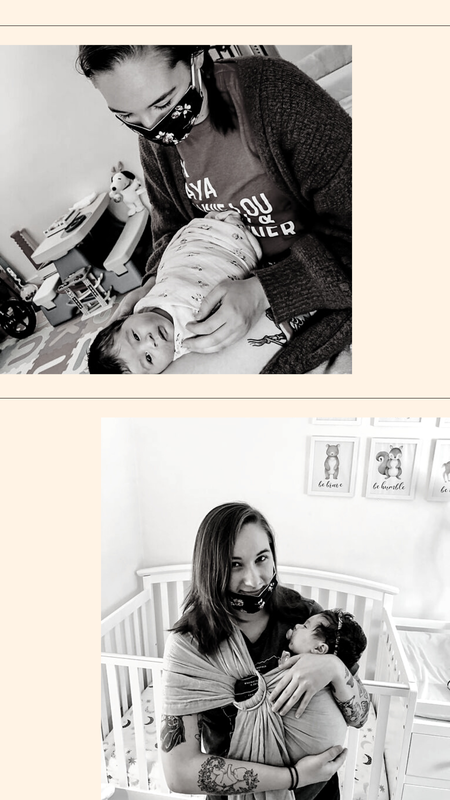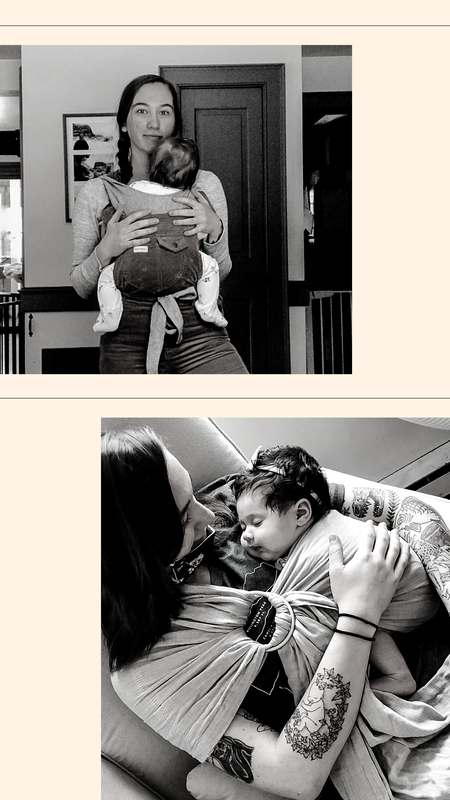|
Birth psychology, also called “prenatal and perinatal psychology” or “reproductive psychology” is the field of study dedicated to psychology in utero and how the mental state of a parent impacts the baby, not just throughout pregnancy, but over the course of their life. This field also covers the psychology of reproductive health, fertility, pregnancy and infant loss, and how birth control impacts psychology. Birth psychology is just beginning to gain more attention as we see the long term effects of stress in pregnancy and the way sleep training can impact mental health long term, but I believe this field should be getting even more attention, especially with the rise of PMADs. As we begin paying more attention to PMADs and how they impact family dynamics, we also begin to see how they impact infants. PMADs is the acronym for Perinatal Mood and Anxiety Disorders. These negatively impact babies and the bonding between parent and baby. I think an important part of healing PMADs is healing the bond between family members affected. This is not the main focus when a mental health crisis occurs, but when we are at a point in care where we can begin focusing on healing our relationships with others (after we heal our relationships with ourselves) this is an important step. “When untreated in a primary caregiver, PMADs adversely affect parental cognitions and beliefs, attachment to the infant, and the growing caregiver-infant relationship. PMADs affect early developmental outcomes of infants including neurosynaptic development, regulatory development, and developmental milestones.” (Hoffman 2016) The Children’s Hospital of Philadelphia says: “When a PMAD goes untreated, it can have unwanted and negative effects on your family. Research shows that depressed and anxious parents often smile less, talk less, and are less likely to touch or engage with their newborns throughout the first year of life.” Not only those in mental health should be aware of why birth psychology education could help in the care they provide families, all people working with expectant families and families of infants should have a basic education around birth psychology. Neonatologists should be aware that children of mothers with PMADs have increased risk of prematurity, sudden infant death, and need for neurodevelopmental and neurobehavioral support services. Child behavioral specialists may even find a link between a certain behavior a child is expressing and an insecure attachment/bond with their parent linking all the way back to pregnancy. Children of parents with depression and anxiety often develop learning, attention or behavioral difficulties as they grow older. Older children may suffer from the loss of maternal/paternal attention and support by becoming depressed or anxious as teenagers. Pregnancy is the root of where our development begins and oftentimes the root of where healing is needed. That is why it is important for both practitioners and parents to have an understanding. Including this topic in curriculum, as a CEU for providers, and in newborn care and childbirth education courses are just a few ways we can begin making this information more widely known, but here are a few tips for expectant parents and parents of infants wanting to heal an insecure attachment or promote a healthy bond right now. How can you promote birth psychology throughout birth, pregnancy, and postpartum? Developmental Milestones and Opportunities for Connection in Pregnancy: Tactile sensitivity begins in the seventh week of gestation and steadily enlarges to include most parts of the body by seventeen weeks and all parts by thirty-two weeks. There are many ways to see a physical reaction and know for yourself that your baby is responding! Talk to your baby! Hearing may begin early in the first trimester or as late as eighteen weeks. Speaking to your baby is a great way to begin bonding. Your baby will begin recognizing your voice specifically. This is a great way to check in with your baby about the emotions you are experiencing. Stress is a normal part of life, but telling your baby what is happening and why can reduce the impacts of stress long term. Interact with your baby! The fetus is aware of light even while the eyelids are still fused together and will react to lights flashed on the abdomen. You can try playing with a flashlight on your abdomen, moving your hands along your abdomen and following your baby as they follow the light. You can also try interacting through noise such as music. You may find your baby prefers Taylor Swift over Beethoven or vice versa! Dreaming Premature babies dream more than anybody else! They show the most smiles, frowns, finger movements, neck stretches, mouth movements, and vocalizations in their dreams. Ultrasound has shown that the beginning of REM/dreaming activity is at just twenty-three weeks! Remember... Your baby is connected with you and is experiencing your emotions on an even deeper level. While it can be important and effective to reduce stress and keep a positive mindset it can also be important to discuss feelings and experiences directly with your baby. This not only teaches emotional regulation, but also offers more bonding opportunities. Try following Karen Strange’s communication tips: 1. Tell your baby what you are going to do BEFORE you do it 2. Tell your baby what is going on 3. Tell your baby what you want them to do 4. Tell your baby the story of what happened When it comes down to it, all your baby wants is to feel how we all want to feel; wanted, welcome, seen, heard, felt, safe, protected, a sense of belonging, and loveable! Four Goals for your Bonded Birth:
Speak to your baby and hold healthy eye contact! Your baby communicates through the universal language of emotion. Our eyes hold much emotion. They are a way we recognize each other and a way that we show we are listening fully. When speaking with your baby, practice holding eye contact. You can look them in the eyes and blink until they begin blinking in sync with you, a bonding exercise! Skin to skin, anytime! Skin to skin is not just important during immediate postpartum. It should be done well into the weeks following, between both parents. It is a great way too bond and should even be done during bottle feeds. During bottle feeds remember to alternate which side you are feeding on, the same way you would with the breast. Family Focused Stress Relief Sometimes whole family focused stress relief is extremely necessary when a parent is home all day and the other is not. The working parent may come home happy, but actually be bringing in more stress because they are not practicing family focused stress relief. The root prevention for this is setting up support systems. Non Gestational Parents: Oftentimes non gestational parents struggle to bond the same way the birthing parent does. This can happen in couples where neither parent is birthing the baby (adoption, surrogacy, etc). These feelings are normal and valid. I think it is important to remember here that so many bonding techniques for straight couples conceiving and birthing a baby do work for LGBTQIA+ community members and non gestational parents of any kind, as well.
Another huge bonding tool, one on one time. One of the biggest recommendations I have for new parents is for the working parent to set up one on one time with the baby. This allows bonding and allows them to care for their partner. Their partner can get to bed early or take some alone time while the working partner is caring for the baby. This could be an hour in the evening just to help with the bedtime routine. Snuggles, stories, and the final feeding done by the working parent while the birthing parent rests or takes a sitz bath. Maybe afterwards you eat dinner together if your baby is asleep and the gestational parent is awake Find a routine that works for your family and allows bonding between all parties. Becoming parents is one of the two top ways to heal insecure attachment. You are a safe haven and secure base for your baby AND for your partner. By caring for ourselves we care for others indirectly, what will that look like for your family? References:
Hoffman C, Dunn DM, Njoroge WFM. Impact of Postpartum Mental Illness Upon Infant Development. Curr Psychiatry Rep. 2017 Nov 6;19(12):100. doi: 10.1007/s11920-017-0857-8. PMID: 29105008. Johnson Rolfes, J., Paulsen, M. Protecting the infant-parent relationship: special emphasis on perinatal mood and anxiety disorder screening and treatment in neonatal intensive care unit parents. J Perinatol (2021). https://doi.org/10.1038/s41372-021-01256-7 White, K., & Martin, M. (2012). Pre-and perinatal experiences for health and healing. Pathways to Family Wellness, winter (36). Wirth, Frederick. (2001). Prenatal Parenting. HarperCollins.
0 Comments
Leave a Reply.The light isn't green forever. AuthorJess Kimball is a Full Spectrum Doula and Certified Lactation Counselor trained in Ayurvedic and Chinese medicine. |
|
EST. 2016
North Carolina | Vermont Jess Kimball |
© COPYRIGHT 2015. ALL RIGHTS RESERVED.
Jess Kimball provides doula care, birth photography, and a variety of other services to families!
|

 RSS Feed
RSS Feed
